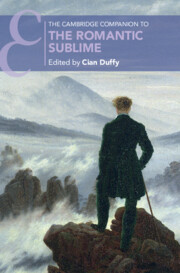Book contents
- The Cambridge Companion to the Romantic Sublime
- The Cambridge Companion to the Romantic Sublime
- Copyright page
- Contents
- Figures
- Contributors
- Abbreviations
- Introduction
- Part I The Sublime before Romanticism
- Part II Romantic Sublimes
- 5 German Romanticism and the Sublime
- 6 The Romantic Sublime and Kant’s Critical Philosophy
- 7 Alpine Sublimes
- 8 Urban Sublimes
- 9 Highlands, Lakes, Wales
- 10 Science and the Sublime
- 11 Musical Sublimes
- 12 The Arctic Sublime
- 13 The Body and the Sublime
- 14 The Sublime in Romantic Painting
- 15 From the Sublime to the Ridiculous
- 16 The Sublime in American Romanticism
- Part III Legacies
- Further Reading
- Index
- Cambridge Companions To …
8 - Urban Sublimes
from Part II - Romantic Sublimes
Published online by Cambridge University Press: 06 July 2023
- The Cambridge Companion to the Romantic Sublime
- The Cambridge Companion to the Romantic Sublime
- Copyright page
- Contents
- Figures
- Contributors
- Abbreviations
- Introduction
- Part I The Sublime before Romanticism
- Part II Romantic Sublimes
- 5 German Romanticism and the Sublime
- 6 The Romantic Sublime and Kant’s Critical Philosophy
- 7 Alpine Sublimes
- 8 Urban Sublimes
- 9 Highlands, Lakes, Wales
- 10 Science and the Sublime
- 11 Musical Sublimes
- 12 The Arctic Sublime
- 13 The Body and the Sublime
- 14 The Sublime in Romantic Painting
- 15 From the Sublime to the Ridiculous
- 16 The Sublime in American Romanticism
- Part III Legacies
- Further Reading
- Index
- Cambridge Companions To …
Summary
This chapter opens by considering the vexed relationship between Romantic poetic practices that were increasingly interested in the powers and perceptions of individuals and the Romantic period’s burgeoning metropolitan profusion. The first sections explore the ambivalent or outright negative attitudes towards cities and their populations expressed by poets such as William Wordsworth, Samuel Taylor Coleridge and Robert Southey and considers how distancing perspectives are employed in writings by Walter Scott and Letitia Landon. The later parts of the essay consider alternative versions of the urban sublime, touching on topographical and statistical representations by Thomas Malton and Patrick Colquhoun; celebrations of multiplicity by Pierce Egan and William Hazlitt; readings against the grain by Charles Baudelaire, Thomas De Quincey and Charles Lamb; and considerations of ruination by John Martin, Anna Laetitia Barbauld and Mary Shelley.
- Type
- Chapter
- Information
- The Cambridge Companion to the Romantic Sublime , pp. 104 - 116Publisher: Cambridge University PressPrint publication year: 2023

